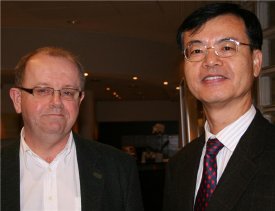Nov 17 2010
LG Innotek, a company within LG, the giant South Korean group of companies, is initiating collaboration with materials researchers at Linköping University in Sweden. The goal of this nine-year project is to develop the manufacture of the semiconductor silicon carbide for electronic components.
"The researchers at Linköping are world class, so it was natural to choose them as a partner. We are very enthusiastic about working with them," said Joo-Won Lee, technical director of LG Innotek, at the project's kick-off meeting in Linköping on November 12 2010.
 Professor Erik Janzén, left, and LG Innotek CTO Joo-Won Lee at project kick-off in Linköping, Sweden.
Professor Erik Janzén, left, and LG Innotek CTO Joo-Won Lee at project kick-off in Linköping, Sweden.
Investments in the high-performance electronics material silicon carbide is a part of the company's newly-determined future strategy. It can be used for things like the undercoating in light-emitting diodes (LEDs), which then give off a much stronger light. LED-based displays and illumination are a priority area, in which the parent company LG is the second biggest in the world. Silicon carbide is also of great interest in the development of components for electric vehicles and the streamlining of green energy production.
"LG Innotek representatives have visited research groups and companies around the world to find a partner for this investment. We've been negotiating with them since the spring, and now the project is underway," says Olle Kordina, senior lecturer and contact person for the project led by professor Erik Janzén.
The project is financed in part by the Republic of Korea. As far as the LiU researchers are concerned, it involves 20 million SEK (2.13 million EUR), and their role is to develop their method of growing high-quality silicon carbide through a process known as epitaxy. LG will also fund a new, state of the art reactor for the purpose.
"We are the only group outside South Korea who will be working for LG on this," Kordina says.
Erik Janzén and his co-workers in the field of semiconductors at the Department of Physics, Chemistry, and Biology have been working for years with silicon carbide, which tolerates very high voltages, extreme temperatures, and has good thermal conductivity. These are properties that offer greater advantages in comparison with silicon where energy conservation and component size are concerned. Previously, the results of their research were commercialised by Norstel, with a factory in the Swedish city of Norrköping.
LG, among other things, has its sights set on the rapidly-growing electric hybrid car market. With heat-resistant silicon carbide transistors, an electric hybrid can get by with just one cooling system, which reduces weight and thereby energy consumption.
"Many car manufacturers are interested in silicon carbide for their future electric cars - for example, Hyundai, Toyota, Volkswagen, and BMW," says Joo-Won Lee.
The challenge for the approximately 50 researchers in the LiU group is to further improve the surface quality of their material and thereby maximise performance. A disc is grown by blowing silicon and carbon in gaseous form into an airless chamber, where they condense onto a surface, atomic layer by atomic layer. The process can be improved by adding an amount of gas of another element.
"We have now developed a new chemical method where we mix in chlorine gas, which increases the speed of growth by ten to twenty times. It will be very interesting for us to test this on a large scale," Janzén says.